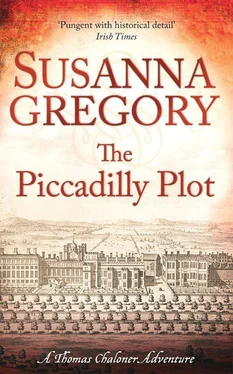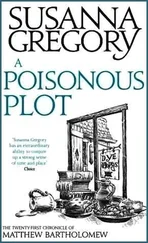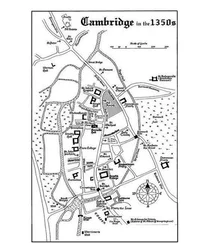Susanna Gregory - The Piccadilly Plot
Здесь есть возможность читать онлайн «Susanna Gregory - The Piccadilly Plot» весь текст электронной книги совершенно бесплатно (целиком полную версию без сокращений). В некоторых случаях можно слушать аудио, скачать через торрент в формате fb2 и присутствует краткое содержание. Год выпуска: 2012, ISBN: 2012, Издательство: Little, Brown Book Group, Жанр: Исторический детектив, на английском языке. Описание произведения, (предисловие) а так же отзывы посетителей доступны на портале библиотеки ЛибКат.
- Название:The Piccadilly Plot
- Автор:
- Издательство:Little, Brown Book Group
- Жанр:
- Год:2012
- ISBN:9780748121052
- Рейтинг книги:3 / 5. Голосов: 1
-
Избранное:Добавить в избранное
- Отзывы:
-
Ваша оценка:
- 60
- 1
- 2
- 3
- 4
- 5
The Piccadilly Plot: краткое содержание, описание и аннотация
Предлагаем к чтению аннотацию, описание, краткое содержание или предисловие (зависит от того, что написал сам автор книги «The Piccadilly Plot»). Если вы не нашли необходимую информацию о книге — напишите в комментариях, мы постараемся отыскать её.
The Piccadilly Plot — читать онлайн бесплатно полную книгу (весь текст) целиком
Ниже представлен текст книги, разбитый по страницам. Система сохранения места последней прочитанной страницы, позволяет с удобством читать онлайн бесплатно книгу «The Piccadilly Plot», без необходимости каждый раз заново искать на чём Вы остановились. Поставьте закладку, и сможете в любой момент перейти на страницу, на которой закончили чтение.
Интервал:
Закладка:
Once Oliver had finished showing off the vault, Chaloner hunted Pratt down in the Lawyers’ Library. This room was already finished, with shelves and panelling in place, and a functional hearth. Pratt was using it as an office from which to work on the rest of the house. It was cold, though, and Oliver immediately set about lighting a fire.
‘What time did you finish work last night?’ asked Chaloner, wondering whether it was possible to glean clues about the thieves by identifying what time they struck.
It was Oliver who replied. ‘Early. Mr Pratt had been called away, but shortly afterwards a question arose about the cornices, which meant we had to stop work to await his decision. Rather than keep the men hanging around idle, I sent them home at three o’clock.’
‘I left at noon,’ said Pratt, adding smugly, ‘Christopher Wren wanted to show me his designs for a new St Paul’s, you see. He values my opinion.’
‘What did you think?’ asked Chaloner curiously. He had seen Wren’s plans, and had been appalled: the architect intended to tear down the iconic gothic building and replace it with a baroque monstrosity of domes and ugly pediments.
‘That without me, he will make some terrible mistakes,’ replied Pratt haughtily. ‘No one has my skill with Palladian porticos.’
Chaloner found the prospect of a cathedral with Palladian porticos vaguely sacrilegious and considered telling Pratt so, but he knew he should not waste time on a debate when he had so much to do. Reluctantly, for he would have liked to denounce Wren’s flashy notions, he turned the discussion back to the thefts. ‘So the supplies could have been stolen yesterday afternoon?’
‘It is possible,’ acknowledged Oliver. ‘All we can say for certain is that they were there when we left. Personally, I do not believe common thieves are responsible. Clarendon has enemies at Court, and I think some of them are doing the pilfering. To annoy us and inconvenience him.’
Chaloner was about to ask if he had any specific suspects, recalling that Hannah believed much the same thing, when Vere shuffled in to announce that the labourers were ready to begin work. The sullen woodmonger regarded Chaloner with disdain.
‘You did not last long as nightwatchman,’ he said. ‘I see real soldiers are doing it now.’
‘Chaloner is still investigating, though,’ said Oliver, endearingly loyal. ‘The Earl just wants him free to do more questioning than watching. He will catch these villains, never fear.’
‘I hope so,’ growled Vere. ‘Because at the moment he suspects my lads of helping the thieves. But he is wrong, and when he has the real culprits in custody, he will owe us an apology.’
‘We shall work on the Room of Audience today,’ announced Pratt, uninterested in what his staff thought about Chaloner’s suspicions. ‘So I shall need all the cherry-wood panels, and as much plaster as you can mix.’
Oliver left to supervise the operation, and Vere followed him out only after shooting Chaloner a gloweringly resentful glare. When they had gone, Pratt closed the door.
‘I suppose you are here about the threat against my life,’ he said. ‘The Earl told me about it yesterday, but there is no need for alarm. It means I have reached an apogee.’
Chaloner regarded him uncertainly. ‘I do not understand.’
‘I mean that ignorant fools often take exception to my buildings, because they do not possess the intelligence to appreciate how exquisite they are. You are probably one of them, which is why you think Clarendon House is too grand. But threats against me are a good thing. They tell me that I have succeeded in making people notice what I have done.’
‘I see,’ said Chaloner cautiously. He had met people with inflated egos in the past, but none who interpreted threats to kill them as a welcome form of flattery. ‘Are you saying that this is not the first time someone has offered to deprive you of your life?’
Pratt shrugged. ‘It is the first time, but it will not be the last. You see, the culprit will be someone who does not understand that my creations are not just a case of hurling up a few bricks, but an expression that is French in inspiration. In other words, the equal proportions of my floors represent a new innovation, compared to the Palladian manner of emphasising a piano nobile .’
Chaloner had no idea what he was talking about. ‘Can you be more specific? About people who have taken against you, I mean, not about a piano nobile .’
‘I built three stately homes before this one,’ replied Pratt loftily. ‘Doubtless there are philistines galore who fail to appreciate my perfect classical lines and I could not possibly list them all.’
‘Are any in London at the moment?’ pressed Chaloner, determined to have a sensible answer.
‘Not that I am aware,’ replied Pratt. He grinned suddenly. ‘I told Wren that there is a plot afoot to kill me, and he was very impressed. No architect can ever say that he has fulfilled his potential until he has designed something that makes people want to kill him.’
Chaloner blinked. ‘Surely you should strive to produce buildings that people will like?’
‘Why? The masses should keep their sorry opinions to themselves, and leave architecture to those of us with the wit and skill to devise great masterpieces.’
‘Modestly put,’ said Chaloner drily.
The sun was beginning to show its face as Chaloner walked towards the cluster of buildings where Piccadilly met the Haymarket. It was heartening, because it was the first time that he had seen it since he had returned from Tangier. Unfortunately, it was obliged to shine through a layer of haze, which lent the city a dirty, slightly yellowish cast that rendered it distinctly seedy.
He reached the junction and looked around. There were perhaps two dozen homes, some detached and others terraced, along with the Gaming House, three taverns and a windmill. As in most of London, dirty, insalubrious hovels rubbed shoulders with edifices that looked as though their residents were comfortably wealthy.
He knocked on the door to the Crown but there was no answer, and he could only suppose that its landlord was still asleep. He raised his hand to rap louder, but a picture of Hannah suddenly came to mind: she would not answer questions if dragged out of bed so soon after dawn. He could force the taverner to cooperate, of course, but it would be more pleasant for everyone if it was done willingly, so he decided to wait until the inn showed some signs of life.
To pass the time, he went to the Gaming House, where he ordered a cup of wine that he had no intention of drinking — it was far too early in the day for strong beverages. The place was comparatively empty, although a game of cards was underway in a corner. The tense faces of the participants, and the thick fug of pipe-smoke that enveloped them, indicated that they had been there for some time and that the stakes were high.
When the wine arrived, Chaloner settled at a table overlooking the street. It was busy now, with carts rolling in from Kensington and Knightsbridge bearing country produce for the great markets at Smithfield and Covent Garden. There were also coaches taking wealthy merchants to business in the city, and a variety of riders, ranging from farmers on plodding carthorses to elegant courtiers on prancing stallions.
Chaloner watched for a while, then picked up the latest government newsbook, which had been left for patrons to peruse. The Intelligencer was published on Mondays and The Newes on Thursdays, to keep the general populace abreast of foreign and domestic affairs. Unfortunately, the government did not like its people knowing what it was up to, lest there was another rebellion, so news tended to be selective, biased and well larded with lies.
Читать дальшеИнтервал:
Закладка:
Похожие книги на «The Piccadilly Plot»
Представляем Вашему вниманию похожие книги на «The Piccadilly Plot» списком для выбора. Мы отобрали схожую по названию и смыслу литературу в надежде предоставить читателям больше вариантов отыскать новые, интересные, ещё непрочитанные произведения.
Обсуждение, отзывы о книге «The Piccadilly Plot» и просто собственные мнения читателей. Оставьте ваши комментарии, напишите, что Вы думаете о произведении, его смысле или главных героях. Укажите что конкретно понравилось, а что нет, и почему Вы так считаете.












